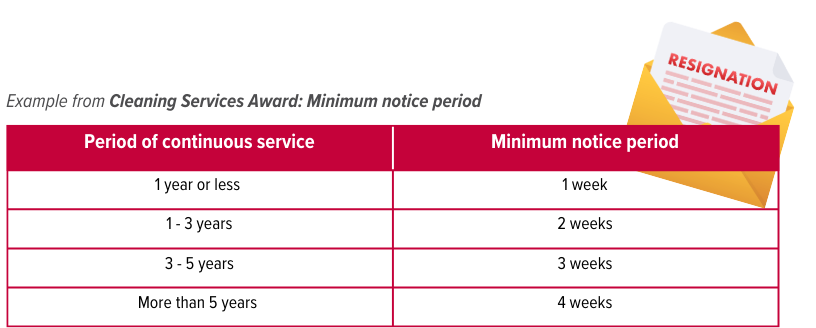Here’s everything you need to know BEFORE leaving “your” job.
When you decide to leave your job (or the decision’s been made for you), it’s understandable to want to move on straight away. But employers and employees have responsibilities when it comes to finishing up employment. If you don’t give notice, or don’t know what to look out for in your very last payslip, then you could be leaving your job with less than you deserve.
Know your notice period
No matter what the reason is for you leaving your job, if you’re a permanent employee, you are required to give notice. Even if you have been dismissed, your boss is still required to give you notice. Make sure you know how many week’s notice for your individual situation because you are entitled to get paid for these weeks.
The National Employment Standards have guidelines that recommend approximately one week per year of service (up to 5 years of service), but official notice periods vary according to your award or agreement, your length of service and sometimes your age when leaving.

If you don’t know how to find your notice period because you don’t know which award or agreement you are covered by, check out our blog on this topic.
Notice period and your pay – get what $$ you deserve
You must be paid for your notice period, whether or not your employer says you have to work through to your official last day. Check your last pay slip carefully to be sure that it includes payment for your notice period.
What else should be in my last pay?
Other items to check for on your last payslip are:
- Your last pay cycle before your notice period began (sounds obvious, but is very easy to miss)
- Any overtime or Time Off In Lieu (TOIL) owing to you
- Annual leave accrual (including for notice period)
- Your super (including for the notice period)
- Long service leave (if relevant in your circumstance)
- Redundancy pay (if relevant)
Redundancy or dismissal? If you see it coming, ALWAYS talk to us first
In nine out of ten cases where an employee is dismissed or made redundant, you can see it coming. Outcomes are a lot better when you get in contact with United Workers Union BEFORE or during any disciplinary meetings or discussion around redundancy. Redundancy and unfair dismissal claims are complex processes so it’s best to call the Member Rights Team in your state or territory.
Get support throughout your job transition
Remember to maintain your UWU membership when you change jobs. Resolving issues after you’ve left your employment – and ensuring your new employment is up to standard – are both a lot easier when you have the support of your fellow union members.
If you’re interested in becoming a member, but want to know more, read up on UWU member benefits here: Why join?
Sign up to our mail list to receive updates and information about your rights at work.

